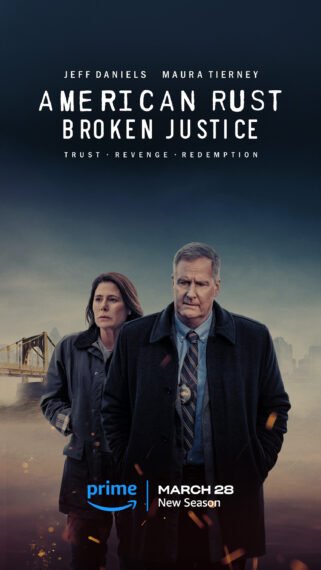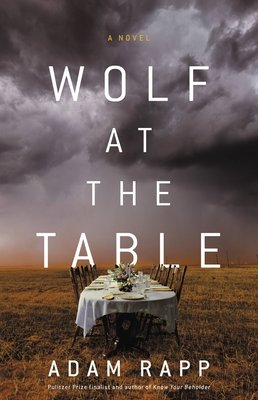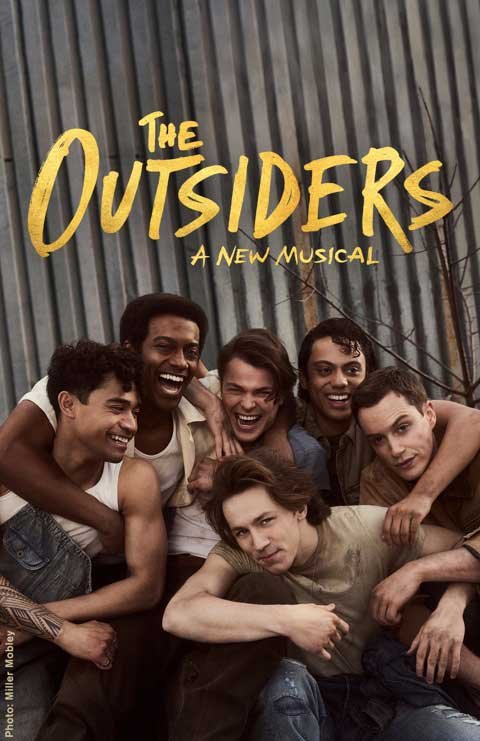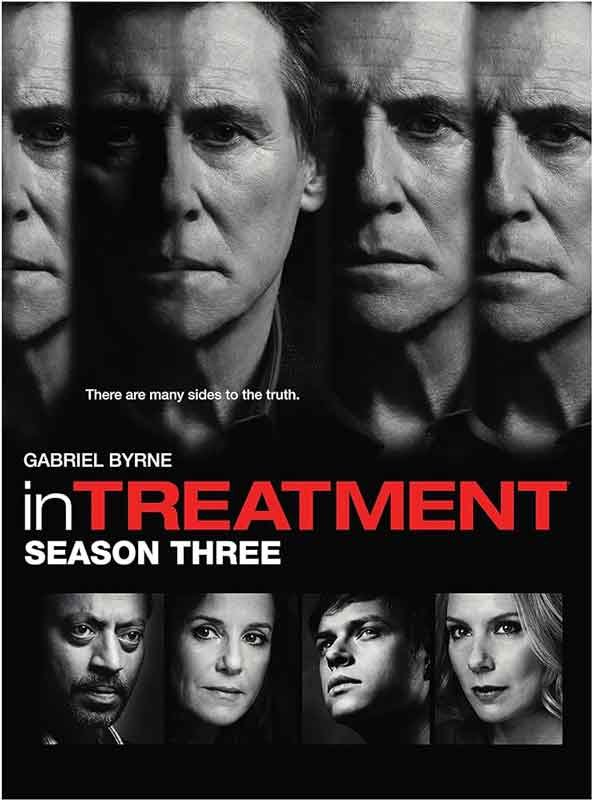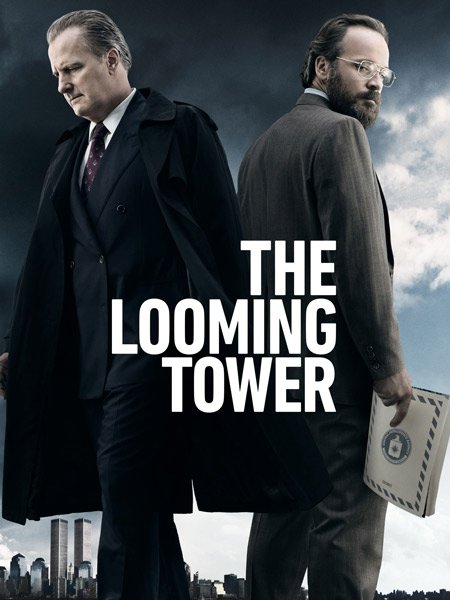What role do the families we’re born into or the traumas we experience shape the people we become? Do good deeds offset bad deeds? How can the arts increase our capacity for empathy, understanding, and kindness?
Dan Futterman is creator, executive producer, and writer of Amazon Prime's American Rust, the acclaimed crime drama starring Jeff Daniels, Maura Tierney, and David Alvarez. Previously, Dan has written screenplays for Capote, Foxcatcher, In Treatment, and Gracepoint. He served as executive producer on The Looming Tower. Dan is also an actor, director, and two-time Oscar nominee.
Adam Rapp is the executive producer and writer of American Rust. He has written plays, films, and series, including Red Light Winter, The Sound Inside, In Treatment, Blackbird, The Looming Tower, and Dexter: New Blood. His latest novel is Wolf at the Table. He recently wrote the book for the new Broadway musical, The Outsiders.
ADAM RAPP
We ended on such a cliffhanger with Isaac presenting the wrench at the police station to Jeff Daniels' character. It allowed us to sort of start from a place of what's going to happen next. And I think because what is drawn in the novel and because of what Danny brought into the original script of the first season and all the ideas he brought in. The biggest thing we talked about was the relationship between Del Harris and Grace Poe and what is the ambiguity there? Who's zooming who? You know, it's not to ever land on one side of it because we're all culpable in some way of being both good and bad, being virtuous and also questionable at times in our own lives. And I think when you start answering questions on either side of that too firmly, I think it allows the audience to disconnect from it and then they go, Oh, he's a monster, or she's a monster. And then you just have this sort of a good and bad guy, good and bad woman narrative that is oversimplified all too often in our culture.
So I think the way season one was built, when we thought about season two, we were trying to run with a lot of the same ideas, even when you go from Isaac's sexuality discovery and the way he's living his life and who he's trusting and who he's giving blind faith to down to Billy. And like, who is he becoming? Is he going to become someone who shoots people? Or is he going to become someone who chooses love and romance?
And I think we kept our North Star about where that gray area is for all our characters. And Rob Yang's character comes to mind (Steve Park), who is driven by the truth and driven by finding justice at all costs to the point where he becomes so self-obsessed he becomes toxic in his own way and hell-bent to find the solution to that mystery in West Virginia.
DAN FUTTERMAN
It felt to me like a lot of the drive of season two is about payback. There are people who feel they're owed things. They want payback. There are people who feel like they have to get back at people because they've been wronged in some way. For Steve Park, there's a feeling of the justice of payback. Something was done that was terribly, terribly wrong, and he's going to right it. In a way, every character has something, some way that they're trying to right the wrong that was done to them or that they did in the first season.
Jeff Daniels’ character, Del Harris, is really driven by trying to right what he sees as wrongs that he did in the first season. And he's staying a little bit away from Grace because he doesn't know how much to blame her for how much were his own decisions or how much she kind of drove him to do things. So that was fun to explore. There's a lot of intertwined stories because of this. So that was a big driver, at least in my mind, and I think in all of our minds.
RAPP
You can't choose your family. You know, I hear that all the time. I'm always amazed when I see families that stick together and wind up being friends at the second, third, fourth decades of their lives. I didn't grow up with that. I didn't see that. I've only seen it as an adult, and it's remarkable when I see it. So I think viewers will relate to this nature versus nurture versus DNA, raising all the questions of psychological and biological inheritance.
THE CREATIVE PROCESS
You’ve both been involved in many adaptations. American Rust, The Looming Tower, Capote, In Treatment, Foxcatcher…Adam, you have just adapted The Outsiders as a musical. What were the challenges of adapting these works?
RAPP
The Outsiders, in particular, S. E. Hinton, Susie Hinton wrote that when she was 15 and 16. It was published when she was 17. She was told by one editor in particular that she couldn't have any swear words, so she was sort of forced to write about these very big, intense, love-and-death operatic themes where there's a boy who dies by suicide by cop. There's a boy who dies from a fire. So it's about grief. His parents die in a car crash prior to all that. There's this hugely stacked deck of grief that exists in the novel. But when you read the novel, there's a very sweet and loving tone to it. So when I started working on it, I recall childhood in Joliet, Illinois. My mom was a single parent, and she raised three kids on her own on a nurse's salary. So I had to give myself permission to take her great dark themes and actions that are in her novel and like give language to it that was also from an adult world.
FUTTERMAN
I write with my wife sometimes, Anya Epstein, who's a terrific writer. We did In Treatment together, the third season. That's actually where we met Adam. Adam wrote a great series of sessions for the wonderful actor Irrfan Khan, who unfortunately died not that long ago. And we're writing something now that's not an adaptation. It's been really freeing and wonderful to do. Each project brings with it different challenges. We had a very, very good experience on The Looming Tower. Adam and I both worked on that. Lawrence Wright was kind of in and out of the writer's room, and he is just an incredible font of information. Even though the book is quite long and packed with information, he just had more to give and contacts with all of these people CIA, FBI, State Department...that was incredible to be able to tap into.
If people have very strong ideas of where they want something to go, you just have to work as a writer within those constraints and try to find your creativity. And so trying to absorb that, run it through your process and your creativity, and put something out that feels true can be challenging.
On the novel, American Rust
Philipp Meyer wrote a very, very beautiful book and it was the reason that made me want to do it. Jeff gave me the book. He'd been having trouble getting it made, getting a script that he liked. And he said to me, "Will you read this and just remind me what I love about it? And if you feel that way?" And I read it very quickly and felt that it was terrific. And there were a lot of possibilities in making it. So just kudos to Philipp Meyer. He wrote a beautiful novel. And if anybody's listening is looking for a great novel to read, there's that and there's Adam Rapp's novel Wolf at the Table.
THE CREATIVE PROCESS
A lot of your work examines violence in American society. What are your reflections on the ways AI, social media or our addiction to screens may be accelerating this? As you think about the future and the importance of the arts, what would you like young people to know, preserve and remember?
RAPP
Right now, live theater is probably much different than looking at a screen. It's much different than looking at your computer or your Game Boy or whatever. I see grown men on the subway playing video games on their phones. And we're not even looking at each other on the subways anymore. We're like deep in our in a screen. And I wonder what that's done. And so I think theater actually has a powerful ability to rewire us to the human experience. And maybe because of it, maybe we can find more empathy or more capacity toward kindness.
This interview was conducted by Mia Funk with the participation of collaborating universities and students. Associate Interviews Producers on this episode were Sophie Garnier and Donna Sanders. The Creative Process is produced by Mia Funk. Additional production support by Katie Foster.
Mia Funk is an artist, interviewer and founder of The Creative Process & One Planet Podcast (Conversations about Climate Change & Environmental Solutions).
Listen on Apple, Spotify, or wherever you get your podcasts.




